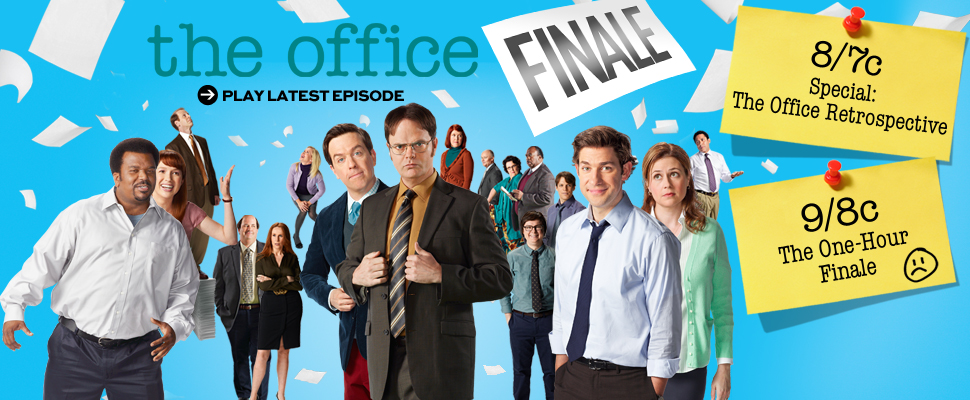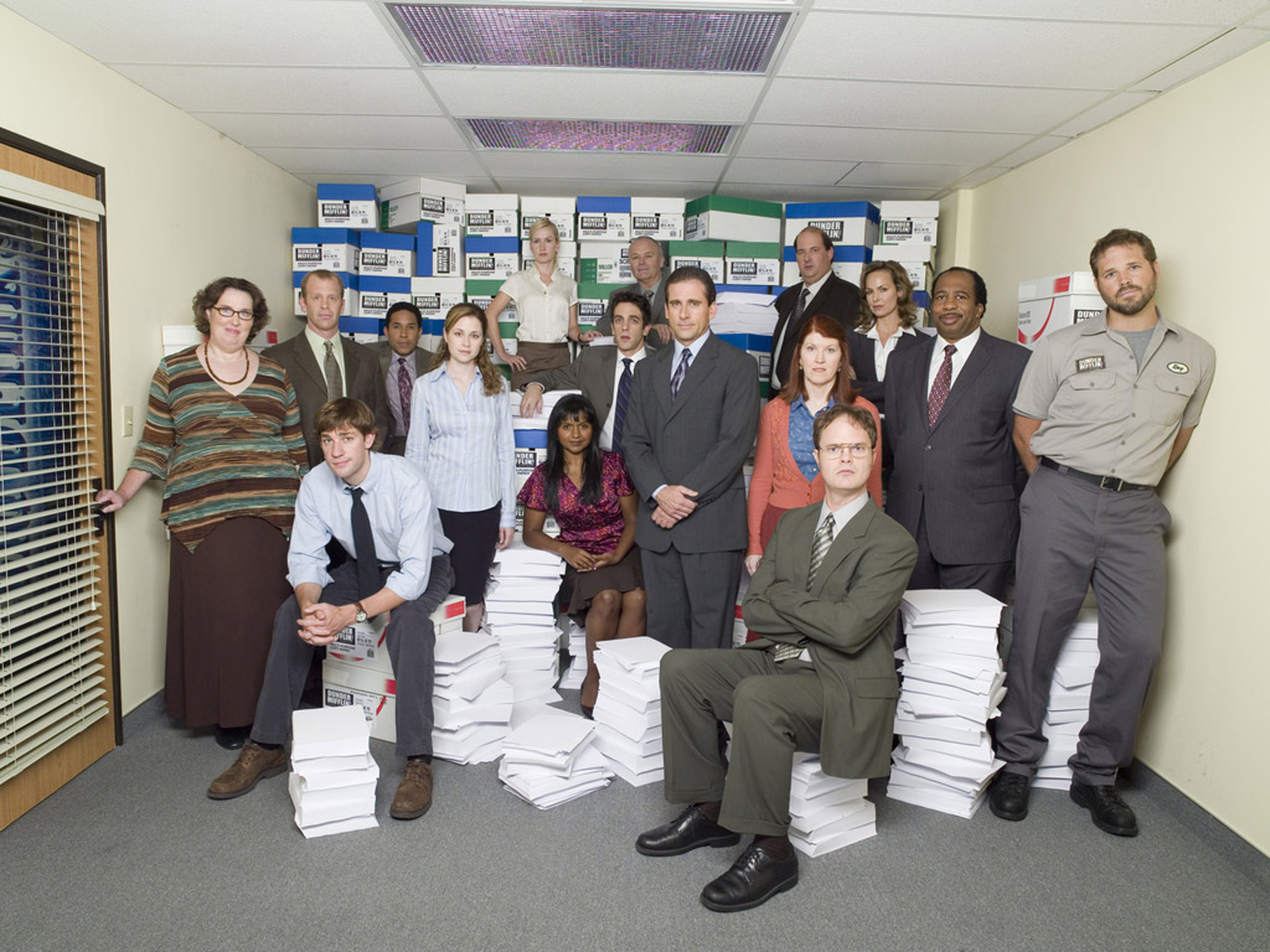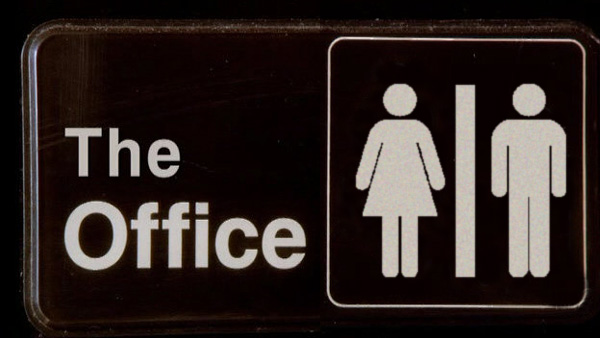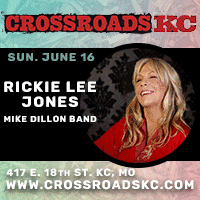 It’s too easy to write a eulogy about a program’s death. In this age of a million online critics and critiques and retrospectives and look-backs, I’d almost guarantee the following lede (or a variation thereof) will be posted and printed in embarrassing abundance:
It’s too easy to write a eulogy about a program’s death. In this age of a million online critics and critiques and retrospectives and look-backs, I’d almost guarantee the following lede (or a variation thereof) will be posted and printed in embarrassing abundance:
The Office died this past Thursday at the ripe old age of 9 after a long battle with Ratings Disease. The much beloved program—who’d seen steady declines in the past two years—leaves behind a lot of good memories, a failed pilot spin-off about a beet farm, and enough shrugs, smirks and befuddled facial expressions to last a lifetime. In lieu of flowers, please send donations to one of the older characters, as their future opportunities will likely be harder to come by.
So I won’t write that kind of thing. (Except, I guess, the part where I just did. But only as a goof, right?)
Nor will I celebrate the departure of a show that had been slowly dying a very visible, very prolonged death. That’s too easy, as well as too lazy. I—along with a lot of other fans from the beginning—haven’t really given a shit for a number of seasons, and for completely understandable reasons.
 But I continued to watch, because it’s hard to give up on someone you once liked so much. You want your pal to quit injecting heroin into his thigh; you want to believe your girlfriend when she says that getting plowed by the whole crew of the Auto Zone was an “isolated incident.”
But I continued to watch, because it’s hard to give up on someone you once liked so much. You want your pal to quit injecting heroin into his thigh; you want to believe your girlfriend when she says that getting plowed by the whole crew of the Auto Zone was an “isolated incident.”
Sometimes our relationships are just too painful to pretend otherwise.
The fact that the comedic television enterprise is such a barren wasteland of rotten hobo-ass these days makes it more difficult, still. I’d re-watch every episode of Seinfeld ten times rather than subject myself to five minutes of Mike and Molly, Two and a Half Men, or Two Broke Girls, One Cup a Guy and a Pizza Place, or whatever the fuck passes for situational comedy these days.
When it was in its prime—the first four seasons, and bits of 5-7—nothing on television was funnier than The Office.
The quirks and minutiae that translated so well from a fictitious workplace environment to your own. The departmental cliques. The obnoxious, relentless cake-parties. The unbridled enthusiasm of a “Pretzel Day” that turns grown men and women into sugar-jonesing degenerates. “Diversity Days” and sexual harassment training. An embarrassing, awkward boss who tries too hard to be relatable and only succeeds in making you angry, and then consequently sorry for being so dismissive of someone merely yearning for acceptance.
The Office was once so simple, and so pure; it was real-life, and only funny because YOU’D been there before. Anyone who has spent any period of time in a similar environment can attest to the innate banality of a corporate office.
But then Michael Scott left, and Jim and Pam ACTUALLY got together (the anticipatory nature of their early, pre-consummate relationship was so much more intriguing and enjoyable), and Dwight became a boorish cartoon character void of any real human characteristics. Oh, and: James Spader, Will Ferrell, Kathy Bates, Roseanne, etc.
Yikes.
 And so I won’t miss what it became—I don’t think many will—but I’ll miss the good times.
And so I won’t miss what it became—I don’t think many will—but I’ll miss the good times.
Michael’s absurdly poor taste in music and farfetched dreams of screenwriting. Jim’s genius, diabolical pranks on Dwight. Dwight’s obsession with bears, beets and Battlestar Galactica. Creed’s beautiful non sequiturs. Kevin’s childlike stupidity. Meredith’s raging, not-so-secret alcoholism and penchant for saggy-flashing.
These are the memories that I choose to take with me into the bittersweet beyond.
We’ll always have reruns.
Thanks for the laughs, you guys.
Follow me on Twitter, @StanfordWhistle









There was a show superior to this one that had the same name. Had Ricky Gervais as the boss and knew when to call it quits. The American version was not as good and did not know when to throw in the towel.
See, I think the strongest episodes of the American version were better than the UK show, but overall, yes, the UK version was vastly superior… and a big part of that was knowing when to call it quits.
Maybe I blame Carell for his need to be liked by everybody in every role that he does and not embrace the boss that everybody loved to hate that Gervais nailed with such grace.
I know what you’re saying. The explanation I heard was that the producers toned his character down specifically for acceptance by American audiences.
But he does that in every damn role he gets. Embrace the dark side just for once, please.
It’s been a weird couple of seasons, but I’m excited for the finale… will someone come out as the Scranton Strangler?
Ha! Excellent.